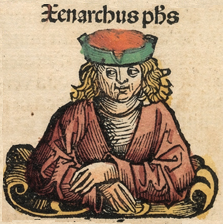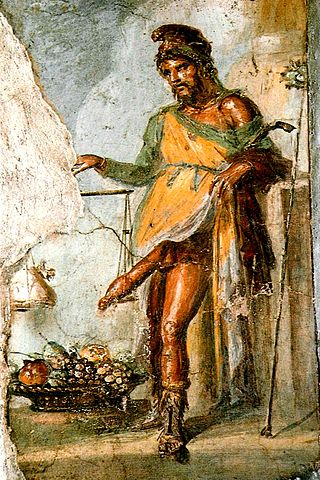| Xenarchus | |
|---|---|
 | |
| Xenarchus carmen | |
| Scientific classification | |
| Kingdom: | |
| Phylum: | |
| Class: | |
| Order: | |
| Family: | |
| Genus: | Xenarchus Herrich-Schäffer, 1855 [1] |
| Synonyms | |
| |
| Xenarchus | |
|---|---|
 | |
| Xenarchus carmen | |
| Scientific classification | |
| Kingdom: | |
| Phylum: | |
| Class: | |
| Order: | |
| Family: | |
| Genus: | Xenarchus Herrich-Schäffer, 1855 [1] |
| Synonyms | |
| |

In mathematics, convolution is a mathematical operation on two functions that produces a third function. The term convolution refers to both the result function and to the process of computing it. It is defined as the integral of the product of the two functions after one is reflected about the y-axis and shifted. The integral is evaluated for all values of shift, producing the convolution function. The choice of which function is reflected and shifted before the integral does not change the integral result. Graphically, it expresses how the 'shape' of one function is modified by the other.

G, or g, is the seventh letter in the Latin alphabet, used in the modern English alphabet, the alphabets of other western European languages and others worldwide. Its name in English is gee, plural gees.

In physics, the kinetic energy of an object is the form of energy that it possesses due to its motion.

Strabo was a Greek geographer, philosopher, and historian who lived in Asia Minor during the transitional period of the Roman Republic into the Roman Empire.

In physics, engineering and mathematics, the Fourier transform (FT) is an integral transform that converts a function into a form that describes the frequencies present in the original function. The output of the transform is a complex-valued function of frequency. The term Fourier transform refers to both this complex-valued function and the mathematical operation. When a distinction needs to be made the Fourier transform is sometimes called the frequency domain representation of the original function. The Fourier transform is analogous to decomposing the sound of a musical chord into the intensities of its constituent pitches.
In chemistry, the molar mass of a chemical compound is defined as the ratio between the mass and the amount of substance of any sample of said compound. The molar mass is a bulk, not molecular, property of a substance. The molar mass is an average of many instances of the compound, which often vary in mass due to the presence of isotopes. Most commonly, the molar mass is computed from the standard atomic weights and is thus a terrestrial average and a function of the relative abundance of the isotopes of the constituent atoms on Earth. The molar mass is appropriate for converting between the mass of a substance and the amount of a substance for bulk quantities.
In mathematics, a function from a set X to a set Y assigns to each element of X exactly one element of Y. The set X is called the domain of the function and the set Y is called the codomain of the function.

In thermodynamics, the Gibbs free energy is a thermodynamic potential that can be used to calculate the maximum amount of work, other than pressure-volume work, that may be performed by a thermodynamically closed system at constant temperature and pressure. It also provides a necessary condition for processes such as chemical reactions that may occur under these conditions. The Gibbs free energy is expressed as
Xenocles was an ancient Greek tragedian. He won a victory at the Dionysia in 415 BC with the plays Oedipus, Lycaon, and Bacchae with the satyr play Athamas. Other plays by Xenocles include Licymnius, parodied by Aristophanes in The Clouds, and perhaps Myes. Aristophanes also refers negatively to Xenocles in the Thesmophoriazusae and Frogs.

Silifke is a municipality and district of Mersin Province, Turkey. Its area is 2,692 km2, and its population is 132,665 (2022). It is 80 km (50 mi) west of the city of Mersin, on the west end of the Çukurova plain.
Xenarchus or Xenarchos was a Greek general of the Achaean League in Ancient Greece who served only for a year from 175–174 BC.

Xenarchus of Seleucia in Cilicia, was a Greek Peripatetic philosopher and grammarian. Xenarchus left home early, and devoted himself to the profession of teaching, first at Alexandria, afterwards at Athens, and last at Rome, where he enjoyed the friendship of Arius, and afterwards of Augustus; and he was still living, in old age and honour, when Strabo wrote. Xenarchus disagreed with Aristotle on many issues. He denied the existence of the aether, composing a treatise entitled Against the Fifth Element. He is also mentioned by Simplicius, by Julian the Apostate, and by Alexander of Aphrodisias.

In Greek mythology, Priapus is a minor rustic fertility god, protector of livestock, fruit plants, gardens, and male genitalia. Priapus is marked by his oversized, permanent erection, which gave rise to the medical term priapism. He became a popular figure in Roman erotic art and Latin literature, and is the subject of the often humorously obscene collection of verse called the Priapeia.

Mimoides phaon, the red-sided swallowtail or variable swallowtail, is a species of butterfly in the family Papilionidae. It is native to the Americas.
Xenarchus admirabilis is a moth of the family Aididae. It was described by William Schaus in 1894 and is found in Brazil.

Xenarchus carmen is a moth of the Aididae family. It is found in Brazil and the Guianas.
Xenarchus was a Greek comic poet of the Middle Comedy. None of his plays have survived, but Athenaeus preserves several quotations from his plays in the Deipnosophistae.
The following people were all minor authors of Greek Middle Comedy. None of their works have survived intact, but later writers of Late Antiquity provide the titles of some of their plays as well as brief quotations.
Archon of Aegeira was an Achaean statesman of the 2nd century BCE.